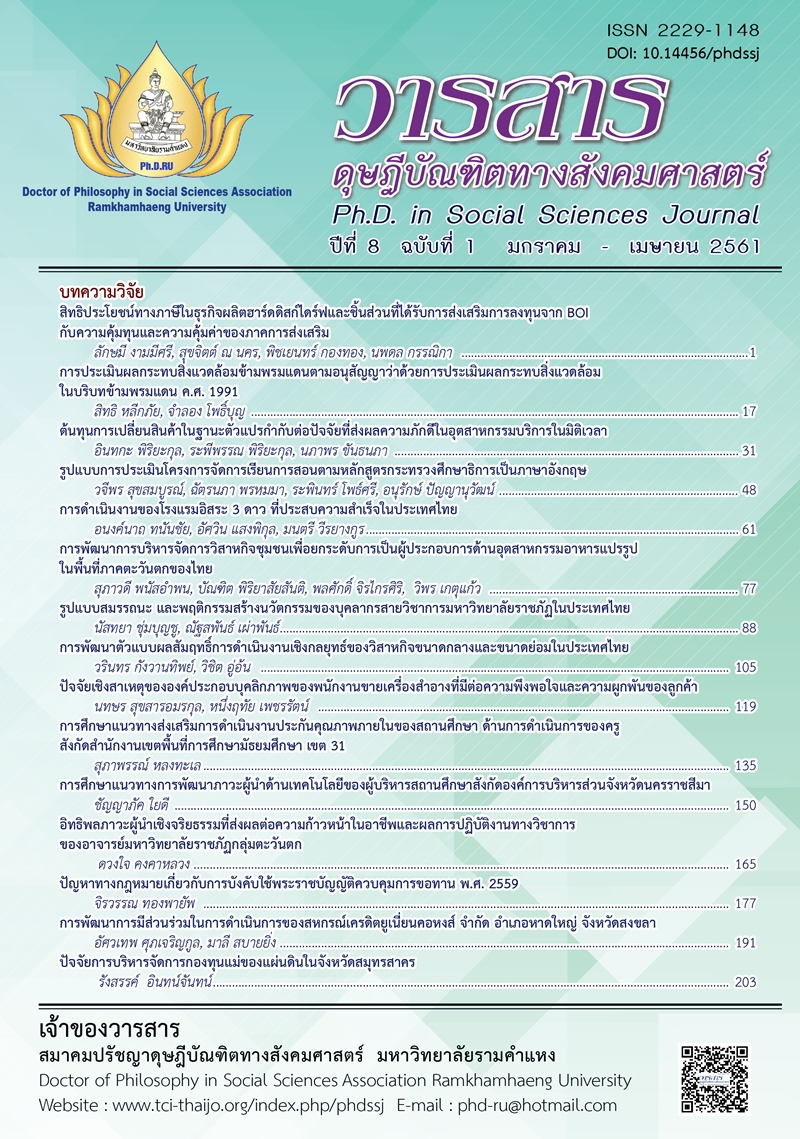A STUDY OF DEVELOPMENT IN TECHNOLOGY LEADERSHIP OF ADMINISTRATORS UNDER NAKHON RATCHASIMA PROVINCIAL ADMINISTRATION ORGANIZATION
Main Article Content
Abstract
This research aimed to study guidelines for developing a technology leadership of school administrators under the authority of Nakhonratchasima Provincial Administration Organization. The group of this research consisted of 97 sample. The statistical analyses were percentage, mean, standard deviation, and t-test.
The results of this research were as follows:
1. The levels of technology leadership of school administrators. Which were classified into ages and work experiences in general, were reported high.
2. The results of comparison of technology leadership of school administrators. Which were classified into ages and work experiences in general, were indifferent.
3. The guidelines for developing technology leadership of school administrators. (1) For the visionary leadership, the school administrators have to study policies of their agency, in order to set up developing goals and promote funding. (2) For the digital age learning culture, the school administrators have to act as leaders in technology; they should encourage teachers or educational related people to build up networks in exchanging. (3) For the excellence in professional practice, the school administrators have to act as leaders in using digital equipment for work. (4) For the systemic improvement, the school administrators have to use strategies of cooperation by inviting all related organizations to participate in making understanding, assigning strategies, planning for the development, and building up learning communities. (5) For the digital citizenship, the school administrators should determine the policies in using technology for learners clearly; they should prepare materials, equipment, and digital instruments that are sufficient for learners to use.
Article Details
Academic articles, research articles, and book reviews in the Ph.D. in Social Sciences Journal are author’s opinions, and not the publisher’s, and is not the responsibility of the Ph.D. in Social Sciences Journal Philosophy Association, Ramkhamhaeng University. (In the case that research is done on human, the researcher has to be trained in Ethics for Doing Research on Human Training and has to produce the evidence of the training).
References
Flanagan, L., & Jacobsen, M. (2003). Technology leadership for the twenty-first century principal. Journal of Educational Administration, 41(2), 124- 142.
International Society for Technology in Education. (2009). Visionary leadership. Retrieved October 30, 2016, from https://www.iste.org/standards/standards/standards-foradministrators [In Thai]
Kerdtip, C. (2006). Development model of educational technology leadership for school administrators under the Office of Basic Education Commission in southern Thailand. Ph.D. dissertation education, Prince of Songkla University. [In Thai]
Khammani, T. (2012). Science teaching (16th ed.). Bangkok: Chulalongkorn University Press. [In Thai]
Nak Ai, N. (2006). The factors of e-Leadership characteristics and factors affecting e-Leadership effectiveness for basic education principals. Ph.D. dissertation education, Srinakharinwirot University. [In Thai]
Nilsook, P. (2008). Human performance technology in organization. Technical Education Journal King Mongkut’s University of Technology North Bangkok, 3(2), 22-27.
Patcharaprateep, S. (2016). Application development database professional audio-visual equipment and buildings at the college of Logistics and supply chain, Suan Sunandha Rajabhat University. Journal of Logistics and Supply Chain College, 2(2), 77-86.
Pechting, N. (2003). Desired competencies of social science instructors in using information and communications technology in state institutions of higher education. Master's thesis of education, Chulalongkorn University Press.
Phuwan, Y., & Nampraseart, S. (2003). ICT for Thai studies. Bangkok: Metsai printing.
Silpakorn University. (2013). Master plan for information technology and communication for education B.E. 2557-2559, 2014-2016. Retrieved November 3, 2016, from https://www.mict.go.th/assets/portals/1/files/download/20ICT2020.pdf [In Thai]
Singhan, P. (2015). School administrators’ competency in using the information communication and technology for supporting the administration and management of education in school under the Office of Educational Service Area 1. Journal of Education, Khon Kaen University, 38(2), 58-166.
Sukkasem, I. (2015). A structural equation model of technology leadership for the office of disease prevention and control, Ministry of Public Healt. Ph.D. dissertation educational administration, Nakhon Ratchasima Rajabhat University. [In Thai]
Tungprasert, D. (2014). A study of factors affecting to information communication and technology leadership of secondary school’s administrators in Nakhon Ratchasima province. Master's thesis education, Nakhon Ratchasima Rajabhat University. [In Thai]
Worakham, P. (2013). The educational research. Mahasarakham: Taksila Printing. [In Thai]
Yee, D. L. (2000). Image of school principal’s information and Communication technology leadership. Journal of Information Technology for Teacher Education, 9(3), 287-302.

